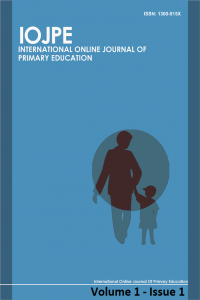THE EFFECTS OF CONCEPT MAPS ON THE ACADEMIC SUCCESS AND ATTITUDES OF 11th GRADERS WHILE TEACHING URINARY SYSTEM
Abstract
The aim of the present study is to support, enrich, and broaden the process of education using concept maps and to determine the effects of concept maps in biology classes on school success, attitude and retention of the knowledge taught. The present study was conducted as an experimental study with pre-test and post-test control groups. The participants of the study were impartially chosen 11th grade high school students from an Anatolian High School and a Teacher Training Anatolian High School. 45 students, 21 in the control and 24 in the experimental group, participated in the study. In the present study, ‘urinary system’ unit was taught. Whereas the control group was taught traditionally, the experimental group was taught using concept map based teaching technique. Data was collected using concept map attitude scale and biology achievement test, a 45 item scale with a reliability coefficient of (α = .78). In order to identify the differences among the groups, biology achievement test was used as pre and post test. Data obtained to determine the achievement of both groups were analyzed using t-test analysis model of the SPSS 11.0 package program. At the end of the study, a statistically significant difference (p<.05) between emerged traditional teaching method and using concept map while teaching. The data also indicated that the cognitive support of the concept maps had a positive impact on students’ achievement and retention of knowledge. The data furthermore indicated that students have a positive attitude for concept maps.
References
- Arnaudin, M. W., & Mintzes, J. J. (1985). Student’s alternative conceptions of the human circulatory system; A cross age study. Science Education, 69(5),721-733.
- Arnaudin, M. W., Mintzes, J. J., Dunn, C. S., & Shafer, T. H. (1984). Concept mapping in college science teaching. Journal of College Science Teaching., 14, 117-121.
- Demirel, Ö. (2004). Öğretimde planlama ve değerlendirme öğretme sanatı. Ankara: Pegem A Yayıncılık.
- Ertürk, S. (1993). Eğitimde program geliştirme. Ankara: Meteksan Matbaacılık.
- Esiolu, G. O., & Soyibo, K. (1995). Effects of concept and vee mapping under three learning modes on students' cognitive achievement in ecology and genetics. Journal of Research in Science Teaching, 32(9), 971-995.
- Franklin, C. E. (1991). An experiment testing the effects of concept mapping on science anxiety and acquisition of scientific knowledge among eighth-grade students low in integrative complexity. Dissertation Abstracts International. 52, 1689A.
- Güçlüer, E. (2006). İlköğretim fen bilgisi eğitiminde kavram haritaları ile verilen bilişsel desteğin başarıya hatırda tutmaya ve fen bilgisi dersine ilişkin tutuma etkisi. Yüksek Lisans Tezi, Dokuz Eylül Üniversitesi Eğitim Bilimleri Enstitüsü, İzmir.
- Jegede, O., Alaiyemola, F., & Okebukola, P. A. (1990). The effect of concept mapping on students' anxiety and achievement in biology. Journal of Research in Science Teaching, 27(10), 951-960.
- Kaptan, F. (1998). Fen öğretiminde kavram haritası yönteminin kullanılması. Hacettepe Üniversitesi Eğitim Fakültesi Dergisi, 14, 95-99.
- Kılıç, S. (2005). Lise I öğrencilerinin canlıların temel bileşenleri ünitesini kavramsal öğrenmelerinin başarıya etkisi. Yayımlanmamış Doktora Tezi, Selçuk Üniversitesi Fen Bilimleri Enstitüsü, Konya.
- Nakipoğlu, C. (1999). Kimya öğretmeni eğitiminde bütünleştirici (constructivist) öğrenme modelinin öğrenci başarısına etkisi. DEÜ Buca Eğitim Fakültesi Dergisi, Özel Sayı, 11, 271-280.
- Novak, J. D., & Gowin, B. D. (1984). Learning how to learn. New York: Cambridge University Press.
- Okebukola, P. A., & Jegede, O. (1988). Cognitive preference and learning mode as determinants of meaningful learning through concept mapping. Science Education, 72(4), 489-500.
- Prankratius, W. J. (1990). Building an organized knowledge base: Concept mapping and achievement in secondary school physics. Journal of Research in Science Teaching, 27(4), 315-333.
- Şan, İ. (2008). Lise2. sınıf biyoloji derslerinde okutulan bitkilerde taşıma sistemi konusunun kavram haritaları ile öğretilmesinin başarıya etkisi. Yayımlanmamış Yüksek Lisans Tezi, Selçuk Üniversitesi Fen Bilimleri Enstitüsü, Konya.
- Thompson, T. L., & Mintzes, J. J. (2002). Cognitive structure and the affective domain: On knowing and feeling in biology. International Journal of Science Education, 24(6), 645-60. Uzuntiryaki, E., & Geban, O. (1999), İlköğretim 8. sınıf çözelti konusunun öğretiminde kavramsal değişim metinleri ve kavram harirtalarının kullanımı. III. Ulusal Fen Bilimleri Eğitimi Sempozyumu Bildiri kitabı, s:142-152.
- Wandersee, J. H., Mintzes, J. J., & Novak, J. D. (1994). Research on alternative conceptions in science (Ed.D.L.Gabel). Handbook of Research on Science Teaching and Learning, New York: McMillan, 177-210.
- Willerman, M., & MacHarg, R. A. (1991). The concept map as an advance organizer. Journal of Research in Science Teaching, 28(8), 705-711.
- Yalın, H. İ. (2003). Öğretim teknolojileri ve materyal geliştirme. Ankara: Nobel Yayınları.
Details
| Primary Language | English |
|---|---|
| Subjects | Other Fields of Education |
| Journal Section | Research Articles |
| Authors | |
| Publication Date | June 30, 2012 |
| Published in Issue | Year 2012 Volume: 1 Issue: 1 |
Creative Commons Licenses

All articles published in International Online Journal of Primary Education's content is licensed under a Creative Commons Attribution 4.0 International License (CC BY 4.0).
(Counter start: February 28, 2021)





